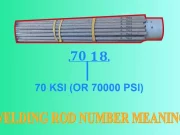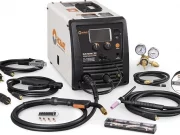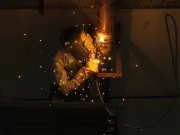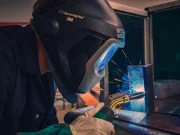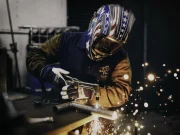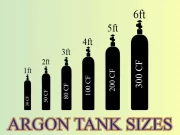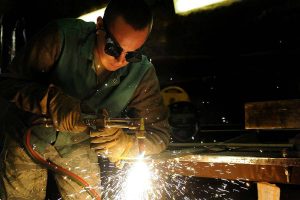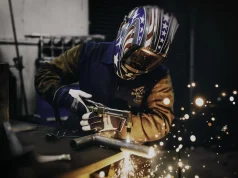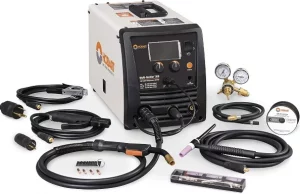What You Can Expect As A Welder
I titled this article, “Is Welding A Good Career,” but maybe I should have used, “Welding Is A Good Career.” If you are searching for a good career path in the trades, welding should be on your list. But, don’t be misled. Every career option has its pros and cons. Welding is no exception. So, let’s see if welding is right for you.
In the short term, a good wage is probably your primary concern. Evaluation of your career opportunities, however, should include more than just annual income. You will want a job that suits your style, of course. But, you will also want one that gives you the best chances for advancement, long-term security, and other opportunities.
You may want to travel, see exotic climes and cultures, or areas of historic note. Working conditions and safety might also be an issue. Or you may want to be independent and run your own business. An unknown benefit of being a welder is that all of these opportunities are available. Welders who can travel and work in arduous conditions are in very high demand and can earn very high salaries. Similarly, steady local work, such as in a machine shop, is common. If you are business-minded and prefer dealing with clients instead of a boss, welding certainly fits that bill. So, if you aren’t interested in academics, art, or literature, a welding career can be a good option.
Despite the many benefits, it has its drawbacks, too. Being a welder does not carry the prestige of being a brain surgeon. You won’t enjoy the year-round comfort of an air-conditioned office, that’s for sure. And, your work attire won’t be silk suits and luxury dress shoes. Telecommuting isn’t an option, either. So, if high fashion, indoor comfort, soft living, big money, and ego are your thing, you can forget being a welder. The chances are high that with that outlook you won’t be at all happy.
What Is Welding?
Let’stake a closer look at what welding entails. Welding is the science of bonding metals such that the joint will be as strong as the metal itself. The welding trade is part of the welding, soldering, brazing, and cutting group. Welding uses very high temperatures to melt and fuse metal parts. Soldering and brazing, on the other hand, use lower temperatures generally below 840 degrees.
Welders are required to read and understand sketches and blueprints, calculate dimensions, join metal pieces in specific configurations, monitor the welding process for safety, and maintain welding equipment. Arc welding is the preferred method for joining metal parts and is common worldwide. But there are over 100 different processes that a welder can use. The metal being joined, and existing conditions will determine the required weld.
The Outlook
The overall outlook for your area of interest is an important aspect of your career search. For welding, the demand is high and continues to grow for the foreseeable future. Welding has come a long way since the days of the tinker or blacksmith. As new technologies evolve, so does the science of welding. As long as industry needs machinery, it will also need skilled technicians to keep it maintained and repaired.
What basic traits does one need before deciding on a welding career? To be proficient as a welder, you need to have good manual dexterity to control the cutting and heating operation of your tools. Physical strength and stamina are important even though you can find work in less taxing environments if needed. The ability to view and understand components in three dimensions will serve you well. And the ability to read and understand technical drawings and literature are basic to the trade. If you have these, then you can feel confident that you can learn and practice the trade of welding.
Getting Started
Like most trades, such as carpentry, painting, and glazing, you can enter the workforce with little or no formal training. Still, most employers will require at least a high school degree or GED. Some employers will train novices where demand is high. You can learn the basic skills and become productive in a matter of weeks. From there, you can add to your skill set with industry standard certifications.
On-the-job-training (OJT) is just one way to learn. Welding is a commonly offered subject in vocational and technical schools. It is also taught in private schools and certification programs. These institutions not only instruct the student in the basic process of welding but familiarize them with basic theory and other supporting subjects. You can enroll in courses such as blueprint reading, shop mathematics, mechanical drawing, physics, chemistry, and metallurgy. Classes in basic electricity are also helpful, and knowledge of computers is becoming important as welders become more responsible for programming robots and other computer-controlled machines.
Types Of Welding
Even though employers will hire entry-level workers, many prefer those who have been through training or credentialing programs. But don’t be surprised if your employer wants you to complete even more technical training for several months on the job. Once you have the essential skills, your career can follow many paths. There is general-purpose welding found on farms or in metal shops. There is also structural welding, pipe welding, and submersed welding, just to name a few. It is rather easy to climb the ladder to more responsibility, perks, and high wages if you are willing to put in the effort.
A welder can also specialize in industry types. These are typically areas such as automotive, shipping, refining, power plants, and specialty manufacturing. All these require ongoing upgrades and renovations. The process is known as “shutdown work.” It is a 24-hour per day effort to get the plant back into production as soon as possible. Welders who do this type of work are known as “road warriors.” Shutdowns require very long hours. When the plant is back online, they must look for another job. Shutdown workers can make very good wages in a short amount of time. The downside is constant travel.
What Can You Earn?
You are probably wondering just what those higher wages might be. As of 2019, the Bureau of Labor Statistics reports that the median wage for this group is $41,380 annually. This is slightly higher than the average of all industry trade wages. The trade is further broken down into the following four subcategories.
Specialty trade contractors $44,580
Repair and maintenance $41,260
Merchant wholesalers, durable goods $40,380
Manufacturing $39,920
Wages will also vary by area. Career One-Stop has created a tool that will search the country by zip code. You can explore the wage potential of any given area here:
https://www.careeronestop.org/Toolkit/Wages/find-salary.aspx?frd=true
Specialty Considerations
Once you complete your training and are looking for that first job, you will want to consider a specialization. The welding industry is immense and has plenty of diversity. The common metals used in manufacturing are steel and iron. But there are specialty metals, including, for example, chrome, aluminum, and lead. Every metal has its unique metallurgy. Specializing in one of these can put you in higher demand and earn you better pay. Take lead for example. It is used in many applications. One is to shield from radiation in hospitals and nuclear facilities. Because of its low melting temperature, lead can be difficult to work. There is a multitude of these specialties you can learn. Specializing in any of these can enhance your career opportunities.
Travel Benefits
The enormous variety of metals and uses keeps things interesting. So do new surroundings. I mentioned earlier that the need for welding can take you around the world. Before you decide on a specific welding career or geographical area, you may want to travel. The early part of your career can be an exciting time. The universal demand for welding allows for overseas adventure. If new sights and cultures interest you, it’s best to use this time before other responsibilities such as family and business exclude them later in life.
Many Other Perks!
Most jobs pay well because they are so distant and foreign. To entice employees to undergo such hardship, companies will give you many incentives beyond lucrative paychecks. Free housing and food are common where American lodging and cuisine aren’t available. They also give ample vacation time or ‘R&R’ instead of paid overtime. Keep these things in mind if seeing the world appeals to you
Job Security
What does the future hold for people in the welding trades? None of us have a crystal ball or we would all be millionaires. But the long-term outlook for anyone in the metal trades, especially welders, is good. America’s aging infrastructure is just one indicator of the future work that will be available. Third-world countries will build more manufacturing to keep their populations employed. New technologies will be implemented to improve production. All of this portends well for welders and other metal workers.
Summary
To summarize, a career in welding can be a very good choice. It has many benefits and a great outlook. The pay is typically above the average trade and can be much higher as your skills improve. It’s an all-weather job and won’t be as comfortable as office work. But the opportunities are abundant and should not be overlooked.




